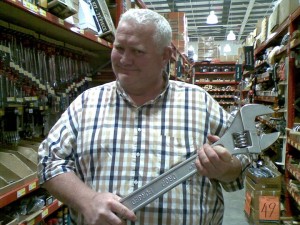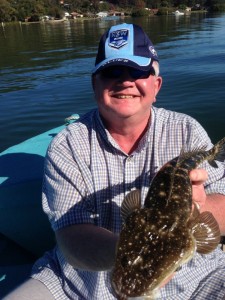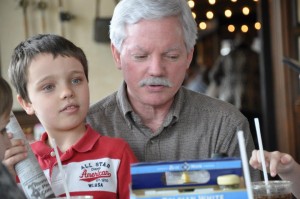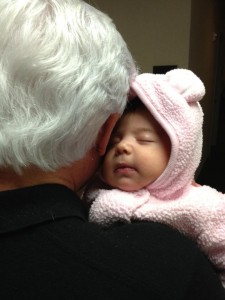by M. C. Jennings | Nov 1, 2016 | Academics, COBA Faculty, Current Students, Research, Uncategorized
by guest blogger, Dr. Ryan Jessup
I present to you the first edition of the second season of the new and improved Jessup Pope (JP) College Football Rankings in which we rank all 128 college football teams in the bowl subdivision based on their performances through the first 9 weeks of the current season.
A very brief history
Last season, Don Pope and I introduced our ranking system which uses a modified version of the Google PageRank algorithm – the algorithm that jump-started the search engine giant and still underlies their current approach today – to allow it to rank teams instead of webpages. We also enabled it to account for home field advantage and temporal decay of performances (this is where games early in the season weigh less in the rankings than more recent games), among other things.
New and improved
You might recall that last season we ended with the same final 4 as the college football playoff (CFP) rankings and predicted that Alabama would defeat Clemson in the Championship by 5.7 points, a game Alabama won by 5 points. Our model (a) beat Las Vegas and (b) correctly predicted the winner of the bowl games 51.2% of the time. For us, that is not good enough. So, in the offseason we grabbed more seasons of college football data to help our system better learn and made a few additional modifications to supercharge the system. When we finally got around to running our new version on last season’s data, we found that it beat Vegas 61% of the time and correctly predicted the bowl game winner 56% of the time.
About our rankings
Before we get into the rankings here are a few quick reminders:
- We do not care about predicting the CFP rankings. We care about good predictions of game outcomes and correctly predicting the CFP rankings may lead us in the wrong direction.
- Our model does not care about win-loss records. A team with a losing record who lost multiple away games against tough teams by narrow margins will likely end up higher in our rankings than an undefeated team that has played a creampuff schedule.
- Our model is not biased by name recognition, what conference a team plays in, or start of the season rankings – three potential weaknesses of human ranking systems.
- Our model is forward-looking so as to predict future outcomes whereas traditional polls and ranking systems are backwards-looking and hence merely describe prior performance.
The rankings
As with last season, we are presenting the rankings using a dotplot which preserves the relative difference in JP values. For example, this image demonstrates that the difference in quality between teams 1 and 2 is larger than the difference between teams 15 and 50!
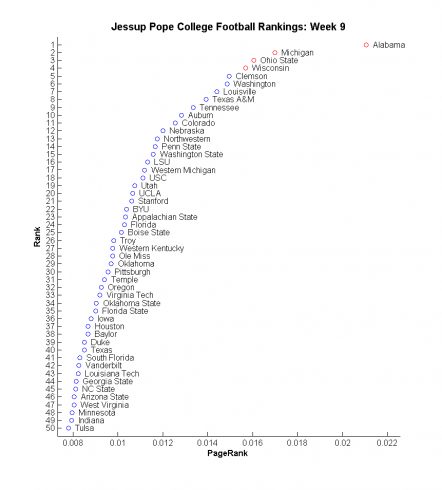
No one should be surprised that Alabama and Michigan are ranked at the top. Our high ranking of Wisconsin is consistent with their strong performances against quality teams, despite their two losses, both against teams that we rank higher (Michigan followed by Ohio State at #3).
My guess is that undefeated Clemson and Washington will round out the CFP’s top 4 in the first ranking of the season which will be released on Tuesday; though, our model suggests that they are currently on the outside looking in. Baylor and West Virginia’s losses this past weekend simplified the problem that would have otherwise arisen – people wondering why those two undefeated teams were ranked so low.
by M. C. Jennings | Oct 12, 2016 | Academics, COBA Faculty, College Decisions, Current Students, Faith Infusion, Research, Uncategorized
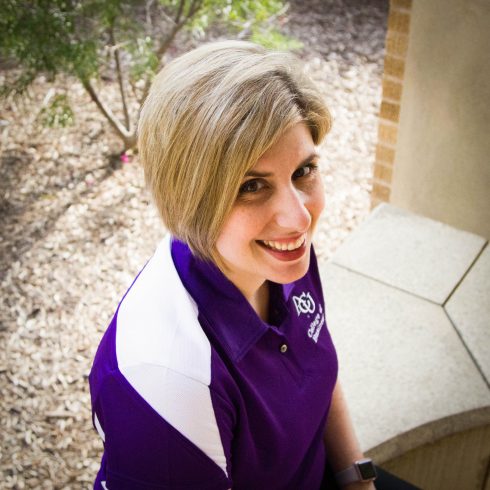
Dr. Katie Wick
What is your educational background?
I was drawn to the University of Virginia for my undergraduate education. The campus is a magical place steeped in history and tradition. When I came to UVA, I was convinced I was going to be a doctor, and as I was taking my first course in chemistry I realized that I was going to have to slog and push myself through my prerequisites for medical school. Simultaneously, I happened to enroll in principles of microeconomics with 550 other undergraduates and the class made my heart sing! I decided I need to dive into economics further.
My game theory and experimental economics classes convinced me to make the study of economics my future. Strategy, games, choices, and decisions came alive in the economics laboratory, and I simply had to find a way to get to graduate school to study further. With the guidance of my advisor, I applied to experimental graduate programs and received an amazing offer from the University of Pittsburgh where the real work in economics began.
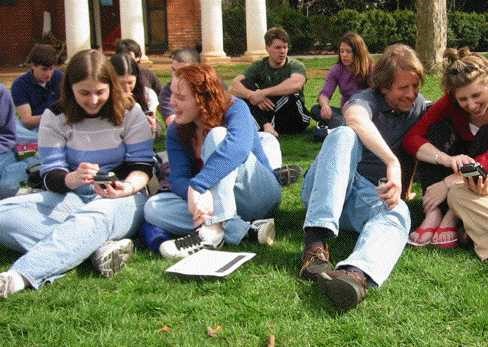
Playing economics games with handheld devices out on the famous UVA lawn with my experimental economics class (that’s me on the very far right in the red and my advisor/professor right next to me). This was a big deal since it was WAY before iPads!
After two to three years of the basic course work (basic is a misnomer since it was scary hard), I started my research in experiments. My dissertation was based around two experiments I designed to test efficiency in public good giving. It was such a thrill to conduct every aspect of the experiment and see it take shape from just an idea to the design then the programming, the recruiting of subjects, the running of the experiment in the laboratory, and the analysis afterward. The day I defended my dissertation was almost as exciting as the days I welcomed my children into the world!
What is your work background?
You’ll notice the narrative of my work history exactly coincides with the development of my family. My first professor job was at Allegheny College in Meadville, PA where I was blessed with amazing students who loved economics as well as game theory and experiments. At the end of my very first week of work, our first foster child came to live with us, a little boy named Braden who we had the privilege of later adopting. Concurrently, my husband was in his family medicine residency, and when he graduated, he would begin active duty with the Air Force due to the terms of his medical school scholarship. After two years of working at Allegheny, my husband was given orders to Dyess Air Force Base in Abilene, TX, which we had to look up on a map! God went before us to provide a community of support including an amazing church and friends.
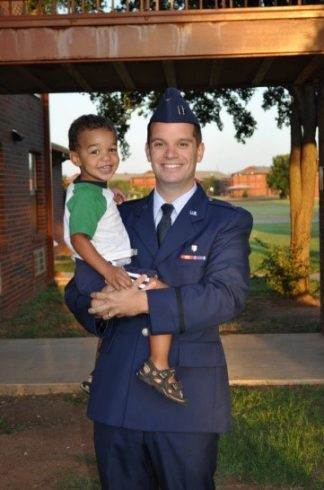
Dr. Matthew Wick, then a captain in the USAF on his first day of active duty service at Dyess with our 2-year-old son Braden.
I was 30+ weeks with our second child when we moved to Abilene, and I took two years off from teaching to be with our small kids. I missed being with students and teaching, and I reached out to the academic community in town. I started teaching part-time at McMurry in the fall of 2012 when I was 36 weeks pregnant with our 3rd child! I had missed the excitement of the first day of school in those two years away. That was a busy semester!
-
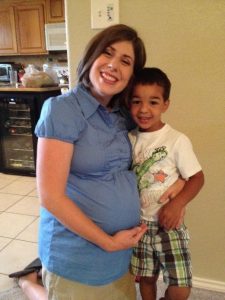
-
The first day back to school in 2012! 36 weeks pregnant with #3.
-
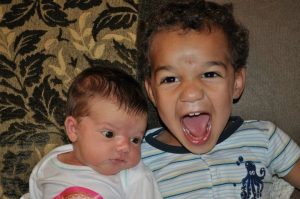
-
My bosses for two years “off”.
I taught part-time at McMurry for one year and full-time for three years. We loved living in Abilene. After my husband’s active duty commitment was over, we decided to stay and put down permanent roots here, and we had one more kid too!
What do you teach at ACU?
My main teaching focus at ACU is the principles of economics courses (macro and micro) and equipping our COBA students for their upper level business classes. This spring I will be teaching one of my favorite classes on game theory which studies choices in strategic settings. We also play a good deal of games which makes it a very fun and memorable class. I also hope to add other economics topics classes in the future.
What drew you to teaching? Why did you want to work with students?
The mentoring process is my favorite part of teaching. I love getting to know about student’s uniqueness and helping them learn material in a way that makes sense to them. I went to a large university where having a mentor relationship with your professor was very difficult if not close to impossible in some cases. It became paramount that my students have a different experience than I did, one where they were known. In addition, I LOVE school, have always loved school, so it’s exciting that I always get to be in school!
What’s the best part of working with students?
I love that I get to be a small part of this transformational time in their lives. College is a shaping experience academically, socially, emotionally, and spiritually. It is a great privilege to be able to encourage them on this journey. In addition, students make me laugh, and they help to keep me relevant.
Outside of teaching, what passions and hobbies do you have?
When I’m not teaching, I’m usually at home or out and about with my “tribe.” They are my biggest hobby and my greatest joy in life. Currently, my kids are 2, 4, 6, and 8 years old so they are still at an age where they require attention which is both great and hard.
Other than my tribe, I love to spend time with my friends, exercise, read, and I am very involved in my church community. I have a huge passion for the foster and adoptive community, and we hope to open our home again to children in the future.
-
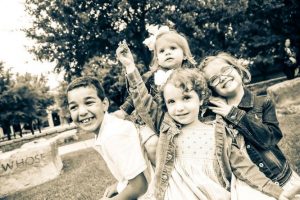
-

-
My tribe of kiddos
What is a good, early story about your teaching?
While I was still a student in my doctoral program, I taught a section of Intermediate Microeconomics in the summer when I was 24 years old. I remember walking into the classroom, very nervous, and one of the students asking me about the professor and if this was known to be a hard class. I giggled on the inside. I guess they thought that I was taking the class and not teaching it!
Tell me about a project or accomplishment that you consider to be the most significant in your career.
Up to this point, I don’t think anything has topped the feeling of the accomplishment of my dissertation. Conducting every aspect of those experiments and single authoring the papers created an incredible sense of triumph.
Do you do any charity or non-profit work?
Most Thursday mornings I work in my church’s food pantry where we provide groceries and household goods to approximately 25 families that day. These families and the others working the food pantry bless my life in tremendous ways. I also lead a life group and counsel couples in the premarital journey with my husband.
Who is your role model, and why?
My parents! My father worked tirelessly to provide for us as well as let us know we were always loved. He was also an incredibly successful surgeon bringing healing to thousands of patients and teaching hundreds of budding doctors. My mom was the rock upon which our whole family stood, and she is our earthly guide in this life. She also led each of her children to know and love the Lord.
Who was your most inspirational professor and why?
There are many, and I could pick inspirational teachers/professors for different phases of my life.
Childhood – my mom, Helen Johnson, who encouraged me to love learning and see it as a constant adventure at a young age.
Middle/High School – Dr. Tracy Inman who taught me an intensive three-week summer course in humanities studying different perspectives of the afterlife at my favorite summer camp (lovingly dubbed nerd camp by my friends and family). Her guidance helped challenge my critical thinking skills and nourish my individual ideas.
College – Dr. Charles Holt who opened my eyes to the world of game theory and experimental economics. At the time, I didn’t know he was such a leader in this field and that working in his laboratory would put me way ahead in skills for graduate school. I was so blessed by his leadership and guidance.
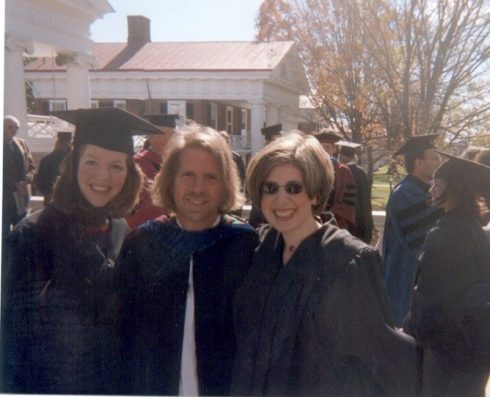
At UVA’s Intermediate Honors (I’m on the far right) with Dr. Charles Holt in the center. We all call him Charlie.
If you could have a superpower, what would it be and why?
Flying! Oh, how freeing it would be! Plus, you could see the world from a different perspective and travel places quickly.
What is something that students might be surprised to find out about you?
My husband and I were dating for less than 10 months when we got married! We are coming up on our 11th anniversary this Christmas.
What would you really want students and alums to know about you?
When I was in graduate school, I longed to teach at a university just like ACU. Working here is a blessing, and teaching, mentoring, and working with students is my professional dream-come-true. I am honored to share in the mission of ACU.
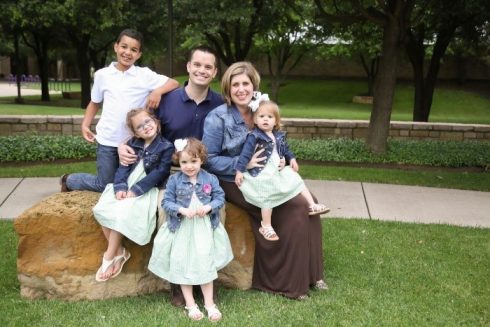
The Wick Family
by M. C. Jennings | Apr 5, 2016 | Academics, COBA Faculty, Mobile Learning, Research, Uncategorized
What is your educational background?
DA, Middle Tennessee State Univ, 1998.
Major: Economics
MBA, Belmont University, 1989.
Major: Business Administration
BBus, University of Western Sydney, 1987
Major: Marketing
Mcert, Blacktown Technical College, 1982
Mitchell High School, Blacktown, N.S.W. Australia, 1975
(All my degrees after high school were done part time while working full time.)
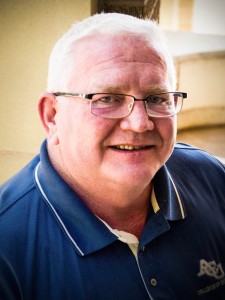
Dr. Ian Shepherd
What is your work background?
Partner, One Pulse. (May 2010 – Present).
Vice President of Operations, Gradeslayer Inc. (October 2005 – Present).
Professor Management Sciences, Abilene Christian University. (2003 – Present).
Associate Professor and Department Chair, Harris College of Business, Faulkner University. (2002 – 2003).
Vice President, Aussie Delivery Services. (July 2006 – Present).
Director of Finance, New Horizons. (June 2007 – May 2009).
Assistant Vice President, Logistics Systems, INGRAM BOOK GROUP. (2001 – 2002).
Assistant Vice President, Consumer Direct Fulfillment, INGRAM FULFILLMENT SERVICES. (1996 – 2001).
Director of Purchasing Operations, INGRAM BOOK COMPANY. (1991 – 1996).
Marketing Research Manager, Dollar General Corporation. (1987 – 1988).
Materials Controller, Alcan Australia Limited. (1978 – 1987).
Inspectors Clerk, New South Wales Police Department. (1976 – 1978).
Hole digger, Metropolitan Water Sewage and Drainage Board (1975)
What do you teach at ACU?
Undergraduate:
• Macroeconomics
• Microeconomics
• Managerial Economics
• International Business
• Operations
Graduate:
• Leadership
• Economics Boot Camp
• Organizational Behavior
• Human Resource Management
What committees/other duties do you have at ACU aside from teaching?
UGEC
What drew you to teaching? Why did you want to work with students?
I have always wanted to teach at the college level. I just had to get ready to do so.
What’s the best part of working with students?
Seeing that look when someone really gets what you are talking about.
Have you ever given up any big opportunities to keep working with students?
50% pay cut to teach.
Lived away from my family for a year to make the teaching profession happen.
Outside of teaching, what passions and hobbies do you have?
Home projects and fishing.
What is a good, early story about your teaching?
I try to use life experiences to get the importance of economic topics across to students. Here is one of my favorite class moments….
The work bag lesson!
It sits in my office.
It sits on my desk in plain view.
Sometimes it goes unnoticed.
Usually no one asks about it.
Today, however, its story was told to my 9:30 am Macroeconomics class. I would be talking about the value of work and how work changes the legacy of your family. I had no better example than what sat at the front of our class. For the entire class my dad’s work bag sat in front of my 100 students. Each student sat there wondering what was going on. I was about to tell them.
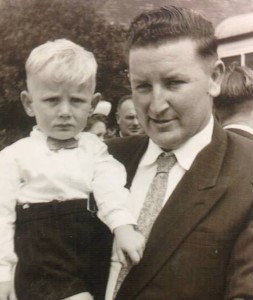
Ian and his father, Cliff Shepherd
Cliffy (Cliff Shepherd for those who did not know him) grew up in Kurrajong at the base of the Blue Mountains west of Sydney. A boy from the bush. He won awards for farming at the county and state shows and can be seen in the attached picture with a serious crop of corn almost 12 feet high. Growing up, dad only finished through the 8th grade. He was a good worker. He worked hard on his dad’s (Cecil’s) farm. I guess he would have stayed farming had he not met the young pretty girl Audrey at a church function. At first Auds (Audrey) did not like dad. She told us she threw stones at him to get him to go away. But as you all know, hate is love in disguise. The boy from the bush and the girl from Granville “Lell in Fove” and were married on New Year’s Eve 1955.
After completing his national service and marrying mum dad was offered a job at Alcan Australia Limited in Granville. It was nowhere near the bush and so different than anything dad had ever experienced. I would be lying if I didn’t tell you that it was mum’s father, Jim Byrnes (a manager at Alcan) that got dad the job. I guess he was looking out for his daughter, Audrey. The job was not a fancy job. It was a case maker. You nailed together boxes to ship the aluminium (yes that spelling is intentional my American friends) sheets, coil, or extrusions. It was (at this time) 6 days a week (5 full days and half day on Saturday).
My first memories of dad as a child were of waking very early on Saturday mornings. Other families would sleep in and enjoy the day, but not ours. At 5:30 am I would here rustling around in the kitchen. It was methodical. The fridge door would open. You would hear items being fumbled and stacked on the table in the darkness. You would then hear items being returned to the fridge. All the time dad would try to be quiet but not quite pull it off. Things would be dropped. Messes would be made. Noises were inevitable. Then you would hear the sandwich, fruit, and drink being placed in the squeaky work bag in preparation for the 6th work day of the week.
I would lay in bed complaining in my head about why this man was keeping me awake! Then I would hear the bag. He would picked it up and as he carried it out the door on the way to work its handle would squeak as it rocked back and forth with each step. Why! I would ask myself. Its 5:30 am when normal people were sleeping. It took fifty or so years for me to grasp what was going on. Each squeak of that handle on each of those 5:30 am mornings was teaching me a lesson. You do what you need to do to take care of your family.
This man, with an eight grade education would go through this routine every day of the week, except for Sundays, for most of his life. I never heard him complain about it. He just did it.
Over the next 45 to 50 years, that young bush boy got out of bed and took that lunch bag to his job. At first he hammered nails. He was good at it. He was also the kind of guy that people liked to be around so dad worked well with people. I can remember when they made him foreman and gave him his own shift to run. I remember when they made him warehouse supervisor in charge of inventory location and movement. I remember when they moved him to work in transportation. Finally, dad was running the warehouse, distribution and transportation nationally for Alcan. Each day, the same thing. Get up, go through the bag loading ritual, work hard, and care for your family. It did not matter that dad had only an eighth grade education. Having little education does not mean you’re stupid. Having no drive to care for your family is stupid, he would tell me. Dad always did what he said he would do. He had promised to care for his family, and for 45 or more years he did that every day without complaint.
When dad retired due to poor health, the bag was stored in the tool shed. It lay there for years gathering dust. I found it two years ago while cleaning out the shed and when Sue (my sister) asked if we should toss it I said no…! It meant too much to me. That day, the enormity of those 45 years of squeaky handle noises struck home.
As kids, we never wanted for anything. We were poor, but we were not in need. We went without, but we were never hungry. We had no TV, flush toilet, or carpet on the floor, but we laughed and loved. We had sheets for curtains and no heat in the house and yet it was a warm place for our family to gather. We played cricket down the driveway with the neighborhood kids and we drove old hand me down Holdens (Chevrolets).
When I look back now I can see his plan. You live your life to make the next generation’s legacy a better legacy than the one you were given. To do that, you have to work hard and be a consistent example to that next generation. The goal is to make things better. If that means hammering nails at 6 am on Saturday, then that is what I will do to make life better for my kids.
That boy from the bush raise three kids and loved his wife. Between them the three children have 8 degrees, the lowest of which is a master’s degree and one a doctorate. They are teachers, executives, and government servants, all with their own homes and families. Not a bad effort on Cliffy’s part if you ask me. Not bad at all.
So the boy from the bush who couldn’t rub two pennies together when he met mum had his story told in class today. As I sit here writing this tome after teaching that class I wonder if the students got the importance of what I was telling them. I can tell you what I got out of that class…..? I suddenly had the desire to be woken up at 5:30 am on a cold Saturday morning as that squeaky bag handle rattles its way to the back door for the ten thousandth time, but this time I get out of bed and I hug the man who made me who I am, and I thank him for what he did to make my life as easy as it is today. Good one Cliffy…good one…!
So what can we learn from this experience?
1. You sometimes don’t know what you’ve got until it’s gone.
2. Persistence makes perfect! Well, at least it teaches us to keep going.
3. What dad worked for took many decades to come to fruition. A good lesson for the “I want it now” generation in patience.
4. Do what you say you will do!
5. You will miss those annoying traits of your loved ones once they are gone.
6. You can’t make Devon (bologna) and sauce sandwiches quietly in the dark.
7. The rustle of a re-used bread bag to wrap a sandwich can frustrate small children.
8. I’d say “oil that handle,” but then I probably would not have had this story to tell.
Tell me about a project or accomplishment that you consider to be the most significant in your career.
The iPad initiative. Interview with CNBC on national television.
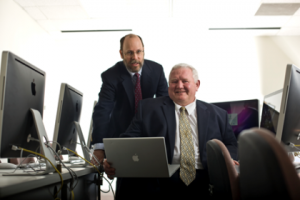
Brent Reeves and Ian Shepherd
Do you do any charity or non-profit work?
No, just regular church work.
Who is your role model, and why?
I have had two great men who have influenced me. The first is, my father, who taught me about life and the church and led by example. The second, my father-in-law who modeled continuing education and study to me.
Who was your most inspirational professor and why?
Most influential was a high school teacher at Mitchell High School in Blacktown in Australia. He taught business and commerce. His name was Max Wilson. He believed in me and made me feel like I could be successful at anything I put my mind to!
If you could have a superpower, what would it be and why?
Invisibility – so I can sleep all day and no one could find me.
What is something that students might be surprised to find out about you?
I slept with my current wife for 6 weeks prior to our wedding in Australia. Of course, I married her twice. Once in Stephenville TX for her side of the family. Then six weeks later for my side of the family in Australia. So, I have been married twice. To the same woman.
We have had three children, but only two are living now.
I played rugby and cricket in Australia.
I also played defensive lineman for the Argonauts in the Australian American Football League in Sydney, Australia.
I have written a humorous book of life stories entitled: “Life Lessons: A roadmap to surviving life’s twists and turns.” Available from Amazon.
-
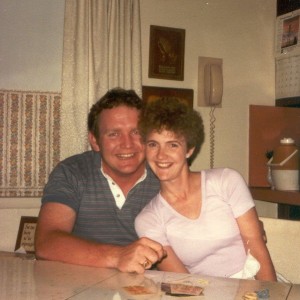
-
Ian and Dee Ann
-
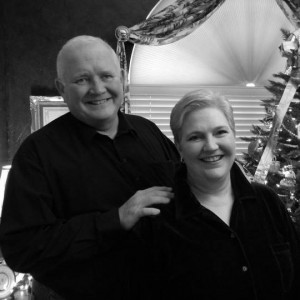
-
Ian and Dee Ann
What would you really want students and alums to know about you?
Born in Sydney in 1956 to Cliff and Audrey Shepherd, Ian spent the first six years of his life living in Granville, a working class suburb of Sydney, with his parents and grandparents. These formative years were spent mostly under the tutelage of his grandmother who provided day care while the rest of the family worked hard to get their own home built. Some of the early stories of his life date to this period and give an interesting insight into the mind of an active young Aussie with time on his hands.
In 1962 the family moved to their new home in Blacktown, a small outer rim suburb of Sydney that had just begun development. The author spent the next twenty-five years in this area completing high school and finalizing a degree in Marketing from the University of Western Sydney (Nepean). It was during these years that the importance of family and church were imprinted on his impressionable mind.
In 1979 Ian married a lifelong friend, Dee Ann Roper a missionary’s daughter, and took up residence in Marayong, a suburb of Sydney. After living and working in the area for nine years they made plans to further their education in America. In 1987 Ian and Dee Ann moved to Nashville Tennessee where they both entered school, Ian to complete his M.B.A. and Dee Ann to complete her Bachelor of Science degree in Music Education. It was during this time that Tabitha (1988), James (1990 deceased) and Ethan (1991) their children were born.
Ian spent many years working in industry in both Australia and the United States. In all his experience he was noted as having a unique sense of humor regarding the workplace and his home life. “After all,” Ian would say, “If I can’t laugh at the silly and stupid things I have done, my life would be pretty boring?” He is also known to tell a good story around the campfire.
After completing his M.B.A. Ian continued his education while working and in 1998 completed a Doctor of Arts degree in Economics from Middle Tennessee State University in Murfreesboro, Tennessee. In July of 2003, Ian moved to Abilene Texas where he is now a Tenured Professor in Economics and teaching online and in the new MBA program.
Ian calls himself a “humorist”, trying to see the funny side of all the events that befall us in life. His stories and humor reflect on the everyday man and his ability to find joy in the simplest of things, mainly his own stupidity.
Ian has lived in the USA for 29 years, but only this year did he become a US citizen. He waited to do so because of his mum (who passed away last year in Australia). His wife (Dee Ann) is a Senior CPA with Davis Kinard in Abilene Texas. Ian has two living children, Ethan Shepherd who graduated from ACU and is an HR Manager at Abilene Regional Hospital, and Tabitha Shepherd who graduated with her masters from the Boston Conservatory. Tabitha teaches in Oregon. Ian’s son, James died at birth.
Ian loves ACU and the environment in which the school molds young lives for Christian Business Service.
by M. C. Jennings | Jan 21, 2016 | Academics, COBA Faculty, Current Students, Faith Infusion, Poverty and Development, Research, Uncategorized
What is your educational background?
I studied social work, psychology, business, environmental design, and poverty reduction at Harding, Cornell, Brigham Young, and London.
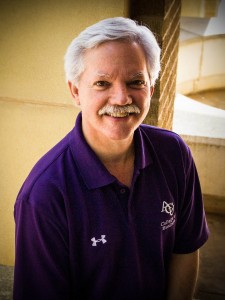
Dr. Monty Lynn
What is your work background?
I’ve enjoyed teaching at ACU for more than three decades! Once in a while, I get the chance to delve into a business environment for a few weeks, most recently last summer with World Vision’s food security team in Washington, DC.
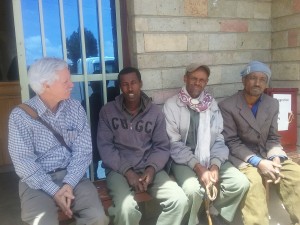
Dr. Lynn on a trip to Ethiopia with VisionFund
What do you teach at ACU?
Management is my primary field. For the past several years I’ve taught the Introduction to Business course and an upper-level course called, “International Poverty and Development.”
What committees/other duties do you have at ACU aside from teaching?
I’ve served in a variety of administrative roles, and loved each one. At present I’m teaching full-time.
What drew you to teaching? Why did you want to work with students?
We have 14 teachers in my family, nine of whom are university professors, so I guess you could say it’s in my blood. When my wife Libby and I first visited ACU, we immediately fell in love with the opportunity to contribute to a Christian business school. It’s been an amazing ride.

Monty and Libby Lynn
What’s the best part of working with students?
Although I enjoy teaching class, it’s the one-to-one encounters with students that create relationships and memories which remain for years.
Have you ever given up any big opportunities to keep working with students?
I can’t imagine not working with students. Working in a university has been a lifelong blessing.

Dr. Lynn working with students on creating lighting for underdeveloped areas
Outside of teaching, what passions and hobbies do you have?
Several years ago I started keeping bees. It’s a modest hobby but it has some interesting bits—a little science, problem solving, the unbelievable wonder of nature, plus, the bees are always trying to kill you. Somehow it’s all quite relaxing.
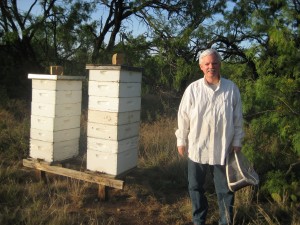
Monty Lynn, aka “Buzzy” the beekeeper
What is a good, early story about your teaching?
I overslept the first final exam I gave at ACU. I arrived ten minutes late with hair dried through the open window of my car as I drove to campus. Somehow the students knew.
Tell me about a project or accomplishment that you consider to be the most significant in your career.
It’s not career, the deep love we feel for our two children, their spouses, and seven grandchildren, and for students we’ve come to know—it’s hard to think of an accomplishment that approaches these in meaningfulness.
Do you do any charity or non-profit work?
Currently, I serve in a local church (Highland) and on a board in Peru—both of which deal with missions and humanitarian development. I enjoy delivering Meals on Wheels on Thursdays too, and often go with students.
Who is your role model, and why?
My parents and in-laws have been exemplars—they’ve lived creative and faithful lives, loving and serving, in pioneering and sacrificial ways. Friends at St. Benedict’s Farm in Waelder, Texas inspire me with their quiet and steady walk with God.
Who was your most inspirational professor and why?
So many professors have shaped me, including professor-colleagues. In terms of inspiration: Keith Warner, a sociologist at BYU, inspired me to think deeply; Warner Woodworth, a BYU business professor, inspired me to act justly; and David Moberg, a research colleague in sociology at Marquette, did both. Duane McCampbell and Dwight Ireland, professors at Harding University, forever changed me with literature and learning.
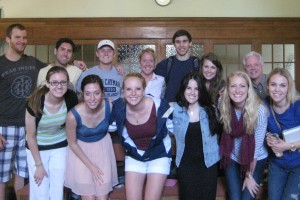
Dr. Lynn with students in Oxford
If you could have a superpower, what would it be and why?
I have enough trouble living with normal powers, but to see one’s desire for God, written on the heart, and to expand human flourishing for all—how wonderful.
What is something that students might be surprised to find out about you?
It’s a real stretch to locate a claim to fame, but my wife’s uncle sang backup for Elvis. Also, I was shot once (everyone survived), was lost in the Canadian Rockies, and I thought very seriously about taking a small airplane for a spin (literally, likely) after finding its key on an airport sidewalk. Oh, and I survived the ACU rodeo (barely) as a member of the COBA faculty steer riding team.
What would you really want students and alums to know about you?
That God’s love, often expressed through others, sustains me; and that he loves us all.
by M. C. Jennings | Jan 12, 2016 | COBA Faculty, College Decisions, Current Students, Research, Uncategorized
The dust has settled on yet another college football season and we can finally evaluate the “success” of our ranking system.
As a reminder, our ranking system takes Google’s PageRank algorithm, which ranks webpages based on links, and modifies it to rank teams based on scores; further, we added some additional components to try and improve the rankings. The ultimate goal of our system is to successfully predict bowl game outcomes: who wins and by how much.
So how did we do?
Well, it could have been worse. Our system ended up predicting the correct winner 51.2% of the time over all 41 bowl games, totaling 21 correct and 20 incorrect predictions. By comparison, the college football playoff (CFP) system was correct 56.3% of the time for games involving at least one top 25 team. This only includes 16 games (they were correct 9 and wrong 7 times). In those 16 games, our model got 1 fewer correct prediction (8 right, 8 wrong). Another comparison metric, perhaps the ultimate, is the Las Vegas line. Our model beat Vegas’ line 51.2% of the time, or again, 21 correct out of 41 games. So, we performed at approximately chance. Or, as Don Pope likes to say, “We did about as well as a blind squirrel flipping a coin would have done.”
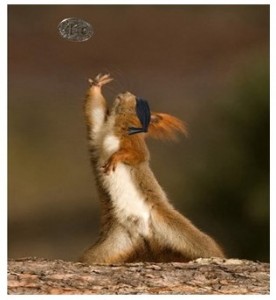
Fig 1. Alternate and equally effective ranking system: A blind squirrel flipping a coin (image courtesy of ACU Acct & Fin major Caroline Thompson)
So what happened?
Let’s blame TCU. Their insanely unlikely comeback caused a 2 game ‘flip’ in all three of our accuracy scores, meaning that we had 1 fewer right and 1 additional wrong prediction when compared to (a) the overall probability correct, (b) the CFP predictions, and (c) the Vegas line. If it weren’t for that comeback, we would have beaten that squirrel.
We did predict the final very accurately (predicting a 5.7 point win for Alabama who won by 5), we missed both the Ohio State win over Notre Dame and the Georgia Southern shellacking of Bowling Green by a country mile.
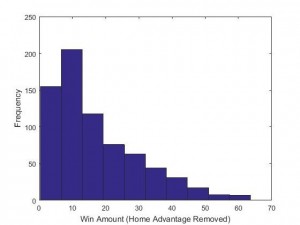
Fig 2. Regular season histogram of win amount differences
Interestingly, the favorite covered the Vegas line 61% of the time. That’s actually rather bad for Vegas as one could have merely bet that the favorite would cover the line on every game and they would have cleaned up. The weakness of that approach is that the opposite might have just as likely occurred.
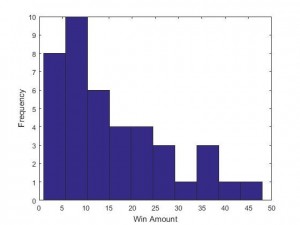
Fig 3. Bowl season histogram of win amount differences
Relatedly, another factor that may have affected our success rate was the number of blowout victories during the bowl season. Figure 2 shows the distribution of win amount differences during the regular season, a beautiful half of a normal distribution (mean=17.1, SD=13.3). However, figure 3, which demonstrates the win amount differences during the bowl season looks markedly different, particularly for everything after the 20 point range (mean=15.61, SD=12). Though we would not expect it to be as perfectly half normal as figure 2, it should look better than it does.
Moreover, because bowl game opponents are supposed to be more evenly matched – as teams are intentionally chosen to play each other so as to match quality – we would also expect the latter figure to be far narrower than it is, with very few blowout victories, having both a substantially smaller mean and SD (e.g., we predicted a mean win amount of 6.7 with SD=5.8).
Other thoughts and final musings
On the whole we have thoroughly enjoyed running our college football prediction system this season. Although it did not quite work out as well as we had hoped, there is always next year. Plus, this little exercise has helped direct us to some weaknesses in our current system worth addressing this offseason.
To close, Don and I would both like to thank MC Jennings for allowing us to make these blog posts and we hope that the readers have found them at least mildly interesting!
Previous JP rankings posts
If you are interested in learning more about our rankings, feel free to read some of our previous posts, linked below.
Post 1: Week 10: Introduction of JP ranking system and initial rankings
Post 2: Week 11: Rankings and additional information on how the system works
Post 3: Week 12: Rankings
Post 4: Week 12: Addendum – Tears on my slide rule, or, What happened to dear old Texas A&M
Post 5: Week 13: Rankings
Post 6: Week 14: Rankings and a measure of comparative predictive performance
Post 7: Week 15: Rankings and discussion of our system’s flaws
Post 8: Final rankings and bowl predictions
Post 9: Bowl predictions addendum
Post 10: Final analysis
by M. C. Jennings | Jan 11, 2016 | Academics, COBA Events, COBA Faculty, Current Students, Research, Uncategorized
Before we make our final post next week summarizing our bowl prediction results we wanted to let you know that our system predicts Alabama will defeat Clemson by approximately 5.7 points.
Previous JP rankings posts
If you are interested in learning more about our rankings, feel free to read some of our previous posts, linked below.
Post 1: Week 10: Introduction of JP ranking system and initial rankings
Post 2: Week 11: Rankings and additional information on how the system works
Post 3: Week 12: Rankings
Post 4: Week 12: Addendum – Tears on my slide rule, or, What happened to dear old Texas A&M
Post 5: Week 13: Rankings
Post 6: Week 14: Rankings and a measure of comparative predictive performance
Post 7: Week 15: Rankings and discussion of our system’s flaws
Post 8: Final rankings and bowl predictions
Post 9: Bowl predictions addendum











